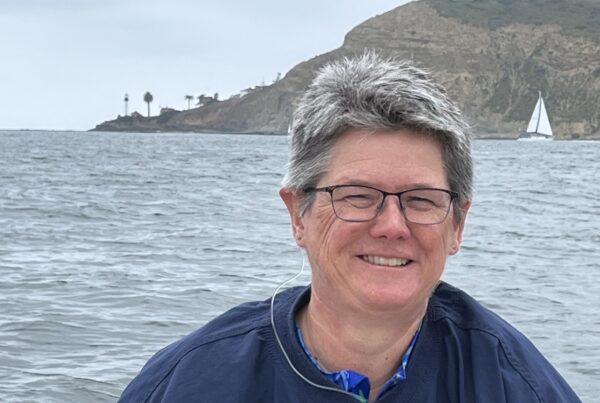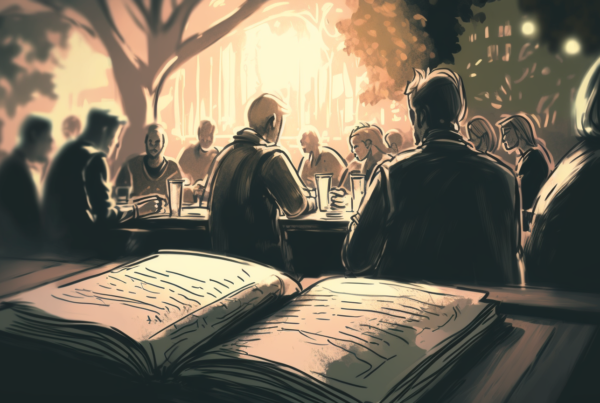How do you live a life spiritually rooted in Christ? What does it really mean to be rooted in faith?
Roots ground you and hold you steady. And in an anxious, uncertain world, Christ is one thing you can depend on. But if you just want to stay still, rooting yourself in Christ is really not your best bet. Christ transforms and sends people out. Depending on where God calls you, being rooted in faith can turn your life upside down.
In this excerpt from Rooted: Growing in Christ in a Rootless Age, Stephen Shaffer considers what we can learn about rootedness from biblical figures like Abraham and Sarah. The material has been adapted from chapter 5, “Go From Your Country: Our Landless Fathers and Mothers.”
A s I lowered the hood of the grill, I noticed Aaron walking down the street. Probably sixteen years old, he often walked back and forth down my street in the late afternoon. He usually stopped by to talk when I was grilling. I can hear his headphones as he walks over. We talk music for a while, then turn to school. I ask his plans for after graduation.
“I don’t know. I just want to live restless, you know?”
“I’m not sure I do. Could you tell me what you mean?”
“I just don’t want to be stuck where I am. Tied down. I feel restless, like I need to go and be somewhere else. Somewhere not here. I just want to live restless.”
He wanted to “live restless.” It was more than wanting to move out of the house or make his own decisions. These are typical feelings of teenagers approaching adulthood. He wanted to communicate more. He was restless. I could see it in his body language. But he wanted to live restless. I felt exhausted for him already.
Spiritually rooted in a restless and rootless culture
Our culture lives with a deep restlessness, a deep rootlessness that stretches back to our exile from Eden. Our mobile culture invites us to be constantly on the move, to let our restless anxiety fuel creativity and productivity. However, more and more of us live on the edge of burnout or something worse. Most of us cannot go back to a simpler life, nor would we always want to. Yet, we must find a different pathway through the complex, restless world in which we live.
God’s people know what it is like to be rootless in the world. God promised land, but also repeatedly called his people out of their lands to follow him. Held by God’s promises, his people could live as sojourners without living restless. Being rooted in faith doesn’t mean standing still. In fact, many Bible stories suggest it’s the opposite.
To see this, we will need to spend time in the story of Abraham and his children, because there are similarities between the vulnerable rootlessness in our society and the experience of the patriarchs. God calls his people to leave behind everything they have known. As God’s people on foreign soil, they live with the vulnerability and contention everywhere they go. However, Augustine echoes the biblical story when he says: “Nevertheless, to praise you is the desire of man, a little piece of your creation. You stir man to take pleasure in praising you, because you have made us for yourself, and our heart is restless until it rests in you.”1
Uprooted by God’s call, still rooted in faith
Sometimes God uproots us before he plants us. God promises Abram land and offspring. He tells him to look out across Canaan and behold the land that he will give his descendants. They will be rooted in the land. They will have a place to learn how to love God and love their neighbor. They will have the blessing of being in God’s country. But first, Abram must get up and go.
Before Israel can be planted in Canaan, Abram must be uprooted from his homeland. God calls Abram, “Go from your country, your people, and your father’s house‐ hold to the land I will show you” (Genesis 12:1). The LORD calls Abram to make a complete break from his past and his identity.
Hearing the call of God, Abram goes. “And Abram went as the LORD had told him” (Genesis 12:4). God speaks and Abram follows. He takes everything—family, livestock, possessions, people. From what we know of the local geography, this is a four-hundred-mile journey. Rooted in his faith, Abram trusts God to uproot him from the life he knows and plant him somewhere new.
The vulnerability of sojourning people
By Genesis 12:10, the land of promise has become a land of emptiness. This place of blessing is experiencing a famine. Abram then goes down to Egypt to live for a while, because Egypt depends less on rainfall and more on irrigation, and is less prone to famine. The word used for “live” means “to live as a stranger.” Abram is not moving to Egypt or taking up permanent residence there. Instead, he is a stranger, an alien, a sojourner.
However, in Egypt, Abram and Sarai are vulnerable. As foreigners they have little to no rights. They cannot call for justice in the same way as the native Egyptians and can thus be easily exploited.
While in Egypt, Sarai’s beauty becomes public knowledge and she gains Pharaoh’s attention. Abram’s plan to pass Sarai off as his sister does little to protect them. Pharaoh is a man who takes whatever he wants, so he takes Sarai into his palace. Abram is treated well, gaining much livestock and many servants, so much that he leaves Egypt richer than when he arrived. But Sarai is taken by Pharaoh and, we learn later, Pharaoh intends to take her as his wife.
God sends plagues upon Pharaoh and his family in the form of disease. God brings judgment on Pharaoh and rescues Sarai. However, the time in Egypt highlights just how vulnerable it is to be rootless.
Abram and Sarai are sojourners. They are aliens in the land of Canaan and in the land of Egypt. Their life and existence are vulnerable because they live in a place, but do not belong there.
Vulnerability is a consistent pattern for Abraham and his descendants. Twice Abraham attempts to pass off Sarah as his sister instead of his wife and both times it almost leads to disaster. Once Isaac did the same with Rebekah. Every time, it is not the people’s cleverness, but the LORD’s hand, that protected those in peril.
Yet, they are vulnerable in the land. Abraham is called out of the land again and again, spending as much time outside the land as within it. Twice he rescues his nephew Lot, who lives outside the land. Even when Sarah dies, because they have no plot of land where they can bury her, Abraham must negotiate to purchase the burial plot at Mamre. Everywhere he goes, Abraham is vulnerable. His life always seems to hang in the balance, but remains held firmly by the LORD. Abraham remains rooted in faith, trusting God in the midst of his vulnerability.
Abrahamic rootlessness
Christians know the fragility and vulnerability of rootlessness all too well. Leaving everything behind to follow God’s call is not unique to Abram. Christians have crossed oceans, left family, left jobs, and entered the vulnerable life of sojourners to go where God leads them. Christians have left safety, security, and comfort behind for unknown lands, unknown futures, and unknown tasks because God called them. Like Abram before us, we have heard the voice of God calling us to get up and go, to leave behind even what is most precious to us, and to go where God will show us. At times, our faith feels like stepping out over a chasm, trusting God will place our feet on solid ground.
This experience of God’s call continues in the life of the church. The desert fathers and mothers leave cities to go into the wilderness. The North African Augustine lives in Rome and Milan. The Frenchman Calvin lives and serves in Geneva. The saints often live as foreigners in a strange land. Sometimes God uproots us before he plants us.
Yet, this Abrahamic rootlessness differs significantly from the rootlessness so prevalent in our culture. Abram steps out rooted in faith, trusting in the promise of God. He and his descendants live without the security of stable homes, citizenship, or worldly belongings because they belong to God and have their eyes on his promise. Because they are spiritually rooted, they are less dependent on physical roots to anchor them. They are people on pilgrimage, walking toward a country they cannot see.
The difference between wandering and pilgrimage
Our culture is committed to wandering, not pilgrimage. There is no destination in sight. The rootlessness we feel in the West is not driven by the longing for the promised land. Our culture does not ache because we anticipate the coming kingdom. We ache because we are not at home and have no idea where to go. As James K. A. Smith describes it, “ours is a pilgrimage without a destination – which is to say, it’s not a pilgrimage at all but rather a pilgrimage deferred, not because we stay home but because we revel in the roaming, or at least try to talk ourselves into that.”2 This land is not our home, but we fear that we might not have a home where we can go.
When I lived in Iowa, there was a local cultural practice, known as “cruising.” Young people would gather on a Saturday night to drive up and down the city’s main streets. They had no destination. In fact, a destination would have ruined the experience. Instead, they got together in their cars, rolled down the windows, turned up the music, and just started driving. The journey—the drive—was the point.
Whatever we think about driving aimlessly on a Saturday night, this picture captures more than the habits of Iowa teenagers. This is symbolic of life in the contemporary West. Not just with our cars, but with our lives, we drive with no destination. We live without an end or goal in sight. Without a destination, there is only the journey. For many of us, the journey becomes the point. It does not matter where we are going—all that matters is who is going with us—or so we tell ourselves. It is not the destination that matters, but the journey we take to get there. We put these slogans on our motivation posters, hoping the words will quiet the unrest in our hearts.
However, where we are going matters as much as how we get there. Our life has a destination. Even if we claim just to be “enjoying the journey,” we are aiming our life in a particular direction. Claiming our life has no destination does not make it true. It simply means we are not paying attention to where we are going. In the words of James K. A. Smith, “Disordered love is like falling in love with the boat rather than the destination.”3
For others, “no destination” means making our own goals, determining our own destination. We can be in control and put the right coordinates into the GPS of our life to get where we want to go. We can all make of our lives whatever we choose. This is ultimate freedom, right?
Conversely, instead of freedom and peace, we find that this lack of destination leads to crippling anxiety. How can we know we have made the right choice? What if we make a mistake and end up at the wrong destination? What if we get to the end of our lives and realize that we should have been going somewhere else all along? The virtually endless choices paralyze many of us or prevent us from committing fully to a single path or a specific person, just in case we have to (or want to) make a shift later in life. External factors, such as economic and political uncertainty, significant debt, or past trauma can make the weight of these choices even heavier.
In some ways, our current cultural challenges can be compared with those of Abraham and his descendants. Our culture’s rootlessness shares a sense of vulnerability with Abrahamic rootlessness. One brick crumbles and it feels like our whole lives are falling down.
Our culture also shares a general feeling of Abraham and his descendants of not being at home in the world. We can be in a place for years and never quite feel like we fit in, like we never quite belong. However, our culture’s solutions only delay or deny the problem. We either pretend that rootlessness is normal and good or we try to make something of ourselves by ourselves. Either way, we are left on our own to make meaning out of a meaningless world.
What it means to be a sojourner who is spiritually rooted in Christ
However much it may look superficially similar to our cultural challenges, Abraham’s rootlessness is completely different in character. It is the rootlessness in the world that comes from finding our firm foundation in God. It is the ability to walk unencumbered in this world because our vision is captured by the promise of dwelling with God.
Abram leaves everything and walks as a sojourner for all his days, not because there is no destination and he might as well make the best of the journey, but because he has heard the voice of the Lord. Abraham can keep moving and never set down roots in this life because his roots are in the kingdom of God.
The solution, then, to the rootlessness we experience in our world is to find our home—our roots—in God. “Living restless” has only led us to anxiety, exhaustion, and burnout. Augustine understood this: “Nevertheless, to praise you is the desire of man, a little piece of your creation. You stir man to take pleasure in praising you, because you have made us for yourself, and our heart is restless until it rests in you.”4 We will be restless until we rest in God. Only souls that have found rest in God can be free to leave everything behind, free to go where the destination is unknown or uncertain, free to follow where the Lord leads.
Content from Rooted: Growing in Christ in a Rootless Age by Stephen Shaffer, ©2022. Used with permission.
Disclaimer: Some of the links in this article are affiliate links, meaning that, at no cost to you, we will earn a commission if you click through and make a purchase. However, we were not paid to review or recommend any of the links on this page.
Rev. Stephen C. Shaffer
Rev. Stephen C. Shaffer serves as the pastor of Bethel Reformed Church in Brantford, Ontario. In addition to his pastoral responsibilities, he has taught at Western Theological Seminary (Holland, Michigan) and served on the Commission on Theology for the Reformed Church in America. He is the author of Our Only Comfort: Daily Devotions through the Heidelberg Catechism, Rooted: Growing in Christ in a Rootless Age, and the forthcoming book, All Things Hold Together: Recovering Christian Worldview (Peniel Press, 2023).



